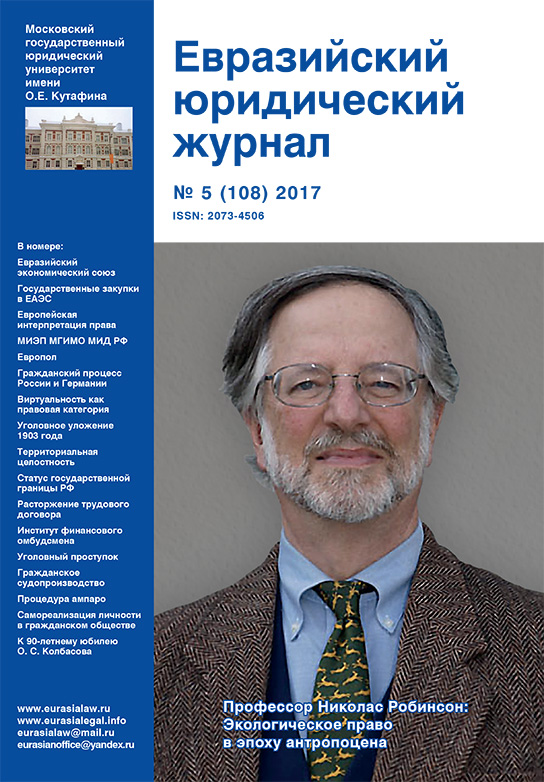Iranian doctrine of preventive self-defense and International law (conclusion) The second and final part of the article, which represents the eighth author's material in the cycle «The Law of International Security» addresses the problems of preventive self-defense in the context of the Iranian-Israel nuclear confrontation. In the context of the stillobserved «creeping» proliferation of weapons of mass destruction, the problem of preemptive military strikes assumes a globally dangerous character. A possible atomic bomb in the hands of the Islamic Republic of Iran causes great concern, first of all, between Israel and the United States. Iran has complained for a long time about a policy of double standards that allows countries that have not signed the Treaty on the Non-Proliferation of Nuclear Weapons (NPT) – India, Pakistan and Israel – to preserve and even build up nuclear arsenals, but punishes Tehran, who signed the NPT, for the alleged partial failure of the IAEA requirements. The article also explores the geopolitical problems of the Caspian region in the context of a possible preventive nuclear strike. Bases of strengthening of the international consent in the conditions of modern migratory processes: European experience and Russian reality In article foreign experience and the Russian realities of the modern multiculturalism urged to provide integration in polietnichny society of foreign-language and foreign culture elements is analyzed.

Need of realization of model of ethnopolitical integration, with forming of effective language educational policy, system of the relations based on mutual understanding and trust for combination of nation-wide and ethnic identity is considered. In the conditions of multilingualism the special role of Russian in these processes is noted. Keywords: smuggling of migrants by Mediterranean Sea, The United Nations Convention against Transnational Organized Crime, 2000, Protocol against the Smuggling of Migrants by Land, Sea and Air, cooperation between countries, IMO, The UN Security Council, UN Security Council resolution 2240, European Union, EU Malta Declaration of 3 February 2017. Work bibliographic list 1. Bekjashev D.K., Ivanov D.V. Mezhdunarodno-pravovoe regulirovanie vynuzhdennoj i trudovoj migracii:monografija. - M.: Prospekt, 2013.
Current problems of socio-economic and cultural integration of migrants in the Russian Federation The article examines the complex problems associated with the characteristic features of economic and cultural integration of migrants in the Russian Federation. Analyzing the development trend of modern social and political processes that contribute to the formation of a civilized convergence and unified secure stable multi-ethnic space, the author identifies a number of topical issues for the improvement of legislative regulation of adaptation of migrants in the Russian Federation.
 Soviet people on the street, in markets, in synagogues, in open meetings in educational. 105 “Spravka v sviazi s predlozheniem o sozdanii Soveta po inostrannomu. 8/6/1971 and “Postanovlenie po prekrashcheniiu ugolovnogo dela,.
Soviet people on the street, in markets, in synagogues, in open meetings in educational. 105 “Spravka v sviazi s predlozheniem o sozdanii Soveta po inostrannomu. 8/6/1971 and “Postanovlenie po prekrashcheniiu ugolovnogo dela,.
Win Expectancy, Run Expectancy, and Leverage Index calculations provided by Tom Tango of, and co-author of. Blackberry extractor v107 serial key free.
It is proposed to implement a set of measures to create favorable conditions for such an adaptation. International legal regulation of free movement of persons: case of the regional economic communities in Africa (ECOWAS, EAC, SADC) The article deals with the experience of international legal regulation of labour migration in the framework of the formation of a common market in three regional economic communities in Africa: the Economic Community of West Africa, the East African Community, the South African Development Community. Among the regional economic communities recognized by the African Union, ECOWAS is the most advanced in the legal regulation of free movement of people, where common passport for travel, which would eventually replace the existing national passport system, was introduced.
We analyze the normative regulation of the free movement of people and labour migration in ECOWAS, since the Protocol on free movement of persons, right of residence and establishment of 1979 in the framework of the basic steps to ensure freedom of movement of people, we explore the term «migrant worker» prevailing in Community law, its development at different stages, the basic rights of migrant workers, including the right to protection from expulsion, collective and individual. It is noted that since 1993 the legal regulation of the freedom of movement in ECOWAS is closely related to the promotion and protection of human rights under. The African Charter on Human and Peoples' Rights. We present practice of regional ECOWAS Court in the area of freedom of movement of persons and the right to work.